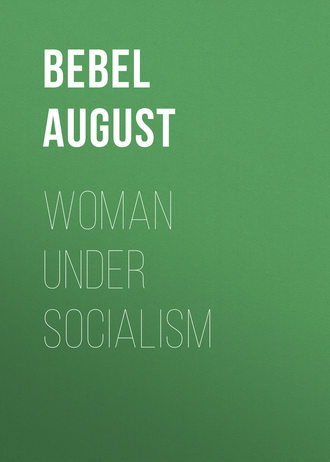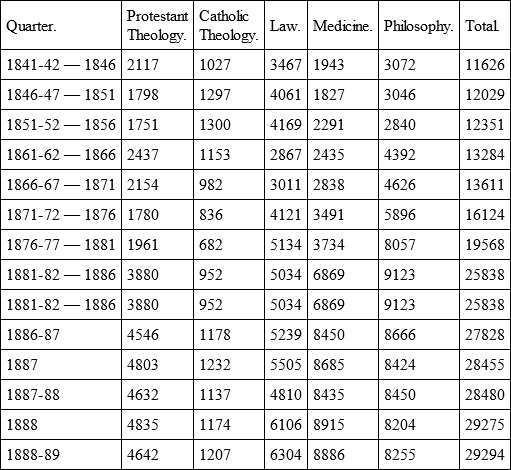 полная версия
полная версияWoman under socialism
This state of things is rendered all the more intolerable by the circumstance that the competitive and mutually destructive struggle of the bourgeoisie compels its own sons to seek for public places. Furthermore, the ever increasing standing army with its swarms of officers, whose promotion is seriously paralyzed after a long peace, leads to the placing of large numbers of men in the best years of their lives upon the pension lists, who thereupon, favored by the State, seek all manner of appointments. Another swarm of lower grade in the army, takes the bread from the mouths of the other stratas. Lastly, the still larger swarm of children of the Imperial, State and municipal officials of all degrees are and can not choose but be trained especially for such positions in the civil service. Social standing, culture and pretensions – all combine to keep the children of these classes away from the so-called low occupations, which, however, as a result of the capitalist system, are themselves overcrowded.
The system of One Year Volunteers, which allows the reduction of the compulsory military service to one instead of two or three years for those who have obtained a certain degree of education and can make the material sacrifice, is another source from which the candidates for public office is swollen. Many sons of well-to-do peasants, who do not fancy a return to the village and to the pursuit of their fathers, come under this category.
As a result of all these circumstances, Germany has an infinitely more numerous proletariat of scholars and artists than any other country, as also a strong proletariat in the so-called liberal professions. This proletariat is steadily on the increase, and carries the fermentation and discontent with existing conditions into the higher strata of society. This youth are roused and spurred to the criticism of the existing order, and they materially aid in hastening the general work of dissolution. Thus the existing condition of things is attacked and undermined from all sides.
All these circumstances have contributed to cause the German Social Democratic party to take a hand in the leadership of the giant struggle of the future. It was German Socialists who discovered the motor laws of modern society, and who scientifically demonstrated Socialism to be the social form of the future. First of all Karl Marx and Frederick Engels; next to them and firing the masses with his agitation, Ferdinand Lassalle. Finally German Socialists are the chief pioneers of Socialist thought among the workingmen of all nations.
Almost half a century ago – grounded on his studies of the German mind and culture – Buckle could say that, although Germany had a large number of the greatest thinkers, there was no country in which the chasm between the class of the scholars and the mass of the population was as wide. This is no longer true. It was so only so long as knowledge was confined to learned circles that stood aloof from practical life. Since Germany has been economically revolutionized, science was compelled to render itself useful to practical life. Science itself became practical. It was felt that science attained its full worth only when it became applicable to human life; and the development of large capitalist production compelled it thereto. All the tranches of science have been, accordingly, strongly democratized during the last decades. The large number of young men, educated for the higher professions, contributed to carry science among the people; then also the general schooling, higher to-day in Germany than in most European countries, facilitated the popular reception of a mass of intellectual products. But above all, the Socialist Movement – with its literature, its press, its unions and meetings, its parliamentary representation, and finally the incessant criticism thereby promoted on all the fields of public life – materially raised the mental level of the masses.
The exclusion law against the Social Democratic party did not check this current. It somewhat hemmed in the Movement, and slightly reduced its tempo. But, on the other hand, it caused the roots of the Movement to sink deeper, and aroused an intense bitterness against the ruling classes and the government. The final abandonment of the exclusion law was but the consequence of the progress made by the Social Democratic party under that very law, together with the economic development of the nation. And thus the Movement goes marching onward, as march it must under existing conditions.
As in Germany, the Socialist Movement has made unexpected progress in all European civilized nations, a fact eloquently attested to by the International Congresses of Labor, which, with intervals of two or three years, gather with ever increased representations.
Thus with the close of the nineteenth century the great battle of minds is on in all the countries of civilization, and is conducted with fiery enthusiasm. Along with social science, the wide field of the natural sciences, hygiene, the history of civilization and even philosophy are the arsenals from which the weapons are drawn. The foundations of existing society are being assailed from all sides; heavy blows are being dealt to its props. Revolutionary ideas penetrate conservative circles and throw the ranks of our enemies into disorder. Artisans and scholars, farmers, and artists, merchants and government employes, here and there, even manufacturers and bankers, in short, men of all conditions, are joining the ranks of the workingmen, who constitute the bulk of the army, who combat for victory, and who will win it. All support and mutually supplement one another.
To woman also in general, and as a female proletarian in particular, the summons goes out not to remain behind in this struggle in which her redemption and emancipation are at stake. It is for her to prove that she has comprehended her true place in the Movement and in the struggles of the present for a better future; and that she is resolved to join. It is the part of the men to aid her in ridding herself of all superstitions, and to step forward in their ranks. Let none underrate his own powers, and imagine that the issue does not depend upon him. None, be he the weakest, can be spared in the struggle for the progress of the human race. The unremitting dropping of little drops hollows in the end the hardest stone. Many drops make a brook, brooks make rivers, many rivers a stream, until finally no obstacle is strong enough to check it in its majestic flow. Just so with the career of mankind. Everywhere Nature is our instructress. If all who feel the call put their whole strength in this struggle, ultimate victory can not fail.
And this victory will be all the greater the more zealously and self-sacrificingly each pursues the marked-out path. None may allow himself to be troubled with misgivings whether, despite all sacrifices, labor and pains he will live to see the beginning of the new and fairer period of civilization, whether he will yet taste the fruit of victory; least of all may such misgivings hold him back. We can foresee neither the duration nor the nature of the several phases of development that this struggle for the highest aims may traverse until final victory, – any more than we have any certainty on the duration of our own lives. Nevertheless, just as the pleasure in life rules us, so may we foster the hope of witnessing this victory. Are we not in an age that rushes forward, so to speak, with seven-mile boots, and therefore causes all the foes of a new and better world to tremble?
Every day furnishes fresh proof of the rapid growth and spread of the ideas that we represent. On all fields there is tumult and push. The dawn of a fair day is drawing nigh with mighty stride. Let us then ever battle and strive forward, unconcerned as to "where" and "when" the boundary-posts of the new and better day for mankind will be raised. And if, in the course of this great battle for the emancipation of the human race, we should fall, those now in the rear will step forward; we shall fall with the consciousness of having done our duty as human beings, and with the conviction that the goal will be reached, however the powers hostile to humanity may struggle or strain in resistance.
OURS IS THE WORLD, DESPITE ALL; – THAT IS, FOR THEWORKER AND FOR WOMANFINISFOOTNOTES:As to her economic development, Germany has made rapid and long strides during the last twenty years; so rapid and so long that the progress has caused the Socialists of Germany, in more instances than one, to realize – and to say so – that, what with her own progress, and with outside circumstances, Germany was distancing England economically. This is true. But the same reason that argues, and correctly argues, the economic scepter off the hands of England places it, not in those of Germany, but in the hands of the United States.
As to her social development, Germany is almost half a revolutionary cycle behind. Her own bourgeois revolution was but half achieved. Without entering upon a long list of specifications, it is enough to indicate the fact that Germany is still quite extensively feudal in order to suggest to the mind robust feudal boulders, left untouched by the capitalist revolution, and strewing, aye, obstructing the path of the Socialist Movement in that country. The social phenomenon has been seen of an oppressed class skipping an intermediary stage of vassalage, and entering, at one bound, upon one higher up. It happened, for instance, with our negroes here in America. Without first stepping off at serfdom, they leaped from chattel slavery to wage slavery. What happened once may happen again. But in the instance cited and all the others that we can call to mind, it happened through outside intervention. Can Germany perform the same feat alone, unaided? Do events point in that direction? Or do they rather point in the direction that the work, now being realized there as demanding immediate attention, and alone possible and practicable, is the completion of the capitalist revolution, first of all?
But even discounting both these objections – granting that both in point of economic and of social development Germany were ripe for the Socialist Revolution – her geographic location prevents her leadership. No one single State of the forty-four of the Union, not even the Empire State of New York, however ripe herself, could lead in the overthrow of capitalist rule in America unless the bulk of her sister States were themselves up to a certain minimum of ripeness. Contrariwise, any attempt by even such a State would be promptly smothered. What is true of any single State of the Union is true of any one country of Europe. It is, therefore, true of Germany. Whatever doubt there be as to Germany's ripeness, there can be none as to the utter unripeness of all the other European countries with the single exceptions of France and Belgium, – and surely none as to Russia, that ominous cloud to the East, well styled the modern Macedon to the modern Greek States of the nations of Western Europe. Though there is no "District of Columbia" in Europe, the masses would be mobilized from the surrounding hives of the Cimmerian Darkness of feudo-capitalism, and they would be marched convergently with as much precision and despatch upon the venturesome leader. And what is true as to Germany on this head is true of any other European country. Facts and their relations to one another must be ever kept in sight. 'Tis the only way to escape illusions – and their train of troubles.
For the rest, not the sordid competitive spirit of the bourgeois world, but that noble and ennobling emulation, cited by the Author in a quotation from John Stuart Mill, animates the nations of the world that are now racing towards the overthrow of capitalist domination. Surely none will begrudge laurels due that one that shall be the first to scale the ramparts of the international burg of capitalism, strike the first blow, and give the signal for the final emancipation of the human race. – The Translator.]

During the summer six months of 1893 – notably the weaker of the two seasons – the total number of students, exclusive of the University of Brunswick, of which we had no returns, had risen to 31,976. Unfortunately we had no like classification of the students, and are hence prevented from inserting it in the above table.
The table shows that from 1841-2 to 1871 the number of students increased little, and less than the population. From that date on the increase was by leaps and bounds, until 1886-7; from this date on the increase is again slow. From 1871 to 1888-9 the number of students increased more than 116 per cent. It is an interesting fact that the study of theology decreased steadily until 1881, but increased thereupon all the quicker until it reached high-water mark in 1888. The reason was that the excess of the supply for all the other posts increased in such measure that it was difficult to secure a place. People then turned to theology which had been neglected during the previous ten years.
1
Bachofen's book appeared in 1861 under the title, "Das Mutterrecht" (Mother-right) "Eine Untersuchung ueber die Gynaekokratie der Alten Welt nach ihrer religioesen und rechtlichen Natur," Stuttgart, Krais & Hoffmann. Morgan's fundamental work, "Ancient Society," appeared in a German translation in 1891, J. H. W. Dietz, Stuttgart. From the same publisher there appeared in German: "The Origin of the Family, of Private Property and the State, in support of Lewis H. Morgan's Investigations," by Frederick Engels. Fourth enlarged edition, 1892. Also "Die Verwandtschafts-Organisationen der Australneger. Ein Beitrag zur Entwickelungsgeschichte der Familie," by Heinrich Cunow, 1894.
[The perspective into which the Pleiades of distinguished names are thrown in the text just above is apt to convey an incorrect impression, and the impression is not materially corrected in the subsequent references to them. Neither Bachofen, nor yet Tylor, McLennan or Lubbock contributed to the principles that now are canons in ethnology. They were not even path-finders, valuable though their works are.
Bachofen collected, in his work entitled "Das Mutterrecht," the gleanings of vast and tireless researches among the writings of the ancients, with an eye to female authority. Subsequently, and helping themselves more particularly to the more recent contributions to archeology, that partly dealt with living aborigines, Tylor, McLennan and Lubbock produced respectively, "Early History of Mankind;" "Primitive Marriage;" and "Pre-Historic Times" and "Origin of Civilization." These works, though partly theoretic, yet are mainly descriptive. By an effort of genius – like the wood-pecker, whose instinct tells it the desired worm is beneath the bark and who pecks at and round about it – all these men, Bachofen foremost, scented sense in the seeming nonsense of ancient traditions, or surmised significance in the more recently ascertained customs of living aborigines. But again, like the wood-pecker, that has struck a bark too thick for its bill, these men could not solve the problem they were at. They lacked the information to pick, and they had not, nor were they so situated as to furnish themselves with, the key to open the lock. Morgan furnished the key.
Lewis Henry Morgan, born In Aurora, N. Y., November 21, 1818, and equipped with vast scholarship and archeological information, took up his residence among the Iroquois Indians, by whom, the Hawk gens of the Seneca tribe, he was eventually adopted. The fruit of his observations there and among other Indian tribes that he visited even west of the Mississippi, together with simultaneous information sent him by the American missionaries in the Sandwich Islands, was a series of epoch-making works, "The League of the Iroquois," "Systems of Consanguinity and Affinity of the Human Family," and "Ancient Society," which appeared in 1877. A last and not least valuable work was his "Houses and Houselife of the American Aborigines." A solid foundation was now laid for the science of ethnology and anthropology. The problem was substantially solved.
The robust scientific mind of Karl Marx promptly absorbed the revelations made by Morgan, and he recast his own views accordingly. A serious ethnological error had crept into his great work, "Capital," two editions of which had been previously published in German between 1863-1873. A footnote by Frederick Engels (p. 344, Swan, Sonnenschein & Co., English edition, 1886) testifies to the revolution Morgan's works had wrought on the ethnological conceptions of the founder of Socialist economics and sociology.
Subsequently, Frederick Engels, planted squarely on the principles established by Morgan, issued a series of brilliant monographs, in which, equipped with the key furnished by Morgan and which Engels' extensive economic and sociologic knowledge enabled him to wield with deftness, he explained interesting social phenomena among the ancients, and thereby greatly enriched the literature of social science.
Finally, Heinrich Cunow, though imagining to perceive some minor flaws in some secondary parts of Morgan's theory, placed himself in absolute accord with the body of Morgan's real work, as stated later in the text in a quotation from Cunow; and, following closely in Morgan's footsteps, made and published interesting independent researches on the system of consanguinity among the Austral-Negros. – The Translator.]
2
In his book against us, Ziegler ridicules the idea of attributing to myths any significance whatever in the history of civilization. In that notion stands betrayed the superficial nature of so-called scientists. They do not recognize what they do not see. A deep significance lies at the bottom of myths. They have grown out of the people's soul; out of olden morals and customs that have gradually disappeared, and now continue to live only in the myth. When we strike facts that explain a myth we are in possession of solid ground for its interpretation.
3
Bachofen: "Das Mutterrecht."
4
Totem-group means generation-group. Each grade or generation has its own totem-animal. For instance: Opossum, emu, wolf, bear, etc., after which the group is named. The totem-animal frequently enjoys great honor. It is held sacred with the respective group, and its members may neither kill the animal, nor eat its flesh. The totem-animal has a similar significance to the patron saint of the guild in the Middle Ages.
5
In the oldest ward of the city of Prague, there is a small synagogue that comes down from the sixth century of our reckoning, and is said to be the oldest synagogue in Germany. If the visitor steps down about seven steps into the half-dark space, he discovers in the opposite wall several target-like openings that lead into a completely dark room. To the question, where these openings lead to our leader answered: "To the woman's compartment, whence they witness the service." The modern synagogues are much more cheerfully arranged, but the separation of the women from the men is preserved.
6
Frederick Engels, "The Origin of the Family."
7
Frederick Engels, ubi supra.
8
Book of Judges, 20, 21 and sequel.
9
Bachofen: "Das Mutterrecht."
10
Of the theater, to which women had no access.
11
Johann Scherr, "Deutsche Kultur-und Sittengeschichte: " Leipsic, 1887. Otto Wigand. As is known, Suderman deals with the same subject in his play, "Die Ehre."
12
Plato, "The Republic," Book V.
13
Leon Bichter, "La Femme Libre."
14
Bachofen. "Das Mutterrecht."
15
K. Kautsky, "Die Entstehung der Ehe und der Familie," Kosmos, 1883.
16
Montegazza, "L'Amour dans l'Humanite."
17
Joh. David Michaelis, "Mosaisches Recht," Reutlingen, 1793.
18
Karl Heinzen, "Ueber die Rechte und Stellung der Frauen."
19
Born 106 before our reckoning.
20
He lived from 527 to 565 of our reckoning.
21
Augustus, the son of Caesar by adoption, was of the Julian gens, hence the title "Julian" law.
22
Tarnowsky. "Die krankhaften Erscheinungen des Geschlechtsinnes." Berlin, August Hirschwald.
23
Tacitus, "Histories," Book I.
24
Montegazza "L'Amour dans l'Humanite."
25
Matthew, ch. 19; 11 and 12.
26
I. Corinthians, ch. 7; 1 and 38.
27
Peter I., ch. 3; 1.
28
Paul: Ephesians, ch. 5; 23.
29
Paul: I. Corinthians, ch. 11; 7.
30
I. Timothy, ch. 2; 11 and 12.
31
I. Corinthians, ch. 14; 34 and 35.
32
This was a move that the parish priests of the diocese of Mainz, among others, complained against, expressing themselves this wise: "You Bishops and Abbots possess great wealth, a kingly table, and rich hunting equipages; we, poor, plain priests have for our comfort only a wife. Abstinence may be a handsome virtue, but, in point of fact, it is hard and difficult." – Yves-Guyot: "Les Theories Sociales du Christianisme."
33
Buckle, in his "History of Civilization in England," furnishes a large number of illustrations on this head.
34
Engels' "Der Ursprung der Familie."
35
The same thing happened under the rule of the muir in Russia. See Lavelaye: "Original Property."
36
"Eyn iglich gefurster man, der ein kindbette hat, ist sin kint eyn dochter, so mag eer eyn wagen vol bornholzes von urholz verkaufen of den samstag. Ist iz eyn sone, so mag he iz tun of den dinstag und of den samstag von ligenden holz oder von urholz und sal der frauwen davon kaufen, win und schon brod dyeweile sie kintes june lit," – G. L. v. Maurer; "Geschichte der Markenverfassung in Deutschland."
37
"Bettmund," "Jungfernzins," "Hemdschilling," "Schuerzenzins," "Bunzengroschen."
38
"Aber sprechend die Holflüt, weller hie zu der helgen see kumbt, der sol einen meyer (Gutsverwalter) laden und ouch sin frowen, da sol der meyer lien dem brütigan ein haffen, da er wol mag ein schaff in geseyden, ouch sol der meyer bringen ein fuder holtz an das hochtzit, ouch sol ein meyer und sin frow bringen ein viertenteyl eines schwynsbachen, und so die hochtzit vergat, so sol der brütigan den meyer by sim wib lassen ligen die ersten nacht, oder er sol sy lösen mit 5 schilling 4 pfenning." – I., p. 43.
39
"History of the Abolition of Serfdom in Europe to the Middle of the 19th Century." St. Petersburg, 1861.
40
Memminger, Staelin and others. "Beschreibung der Wuertembergischen Aemter." Hormayr. "Die Bayern im Morgenlande." Also Sugenheim.
41
"Ueber Stetigung und Abloesung der baeuerlichen Grundlasten mit besonderer Ruecksicht auf Bayern, Wuertemberg, Baden, Hessen, Preussen und Oesterreich." Landshut, 1848.
42
A poem of Albrecht von Johansdorf, in the collection of "Minnesang-Fruehling" (Collection of Lachman and Moritz Haupt; Leipsic, 1857; S. Hirtel), has this passage:
"waere ez niht unstaeteder Zwein wiben wolte sin fur eigen jehen,bei diu tougenliche? sprechet, herre, wurre ez iht?(man sol ez den man erlouben und den vrouwen nicht.)"The openness, with which two distinct rights, according to sex, are here considered a matter of course, corresponds with views that are found in force even to this day.



